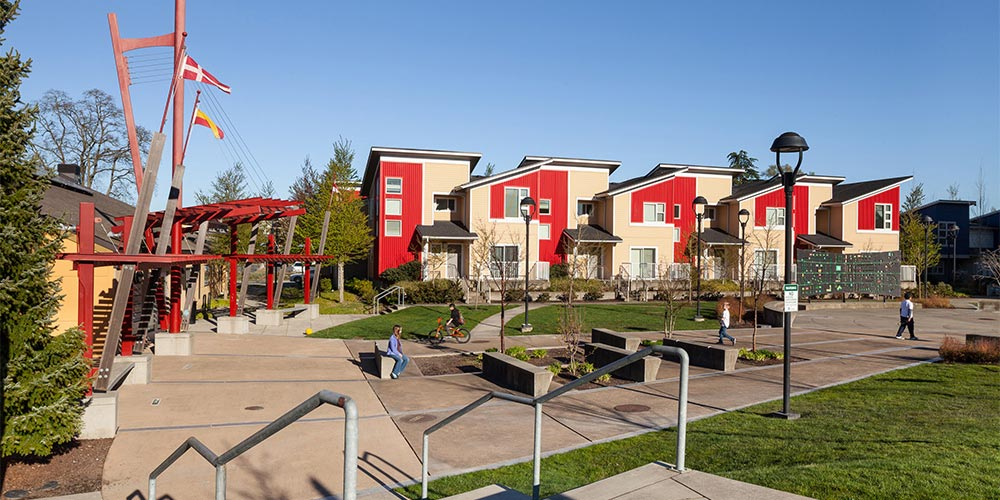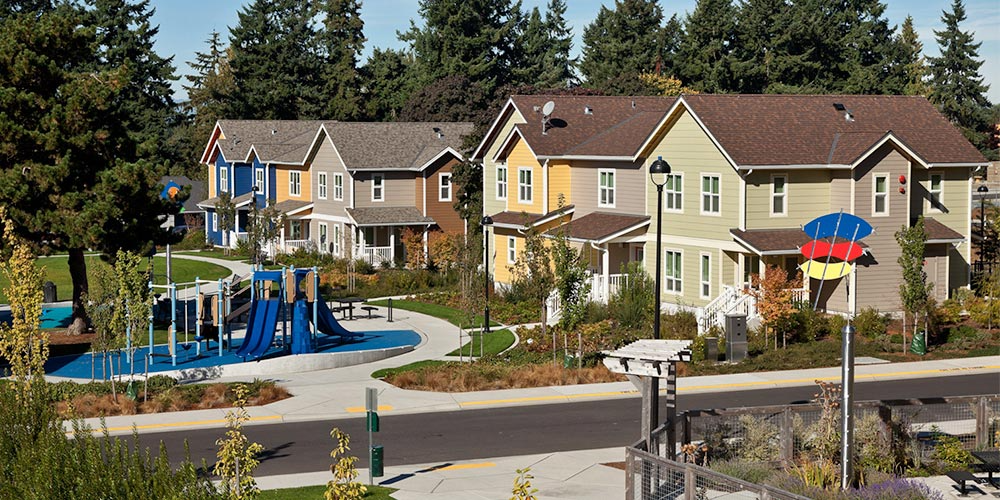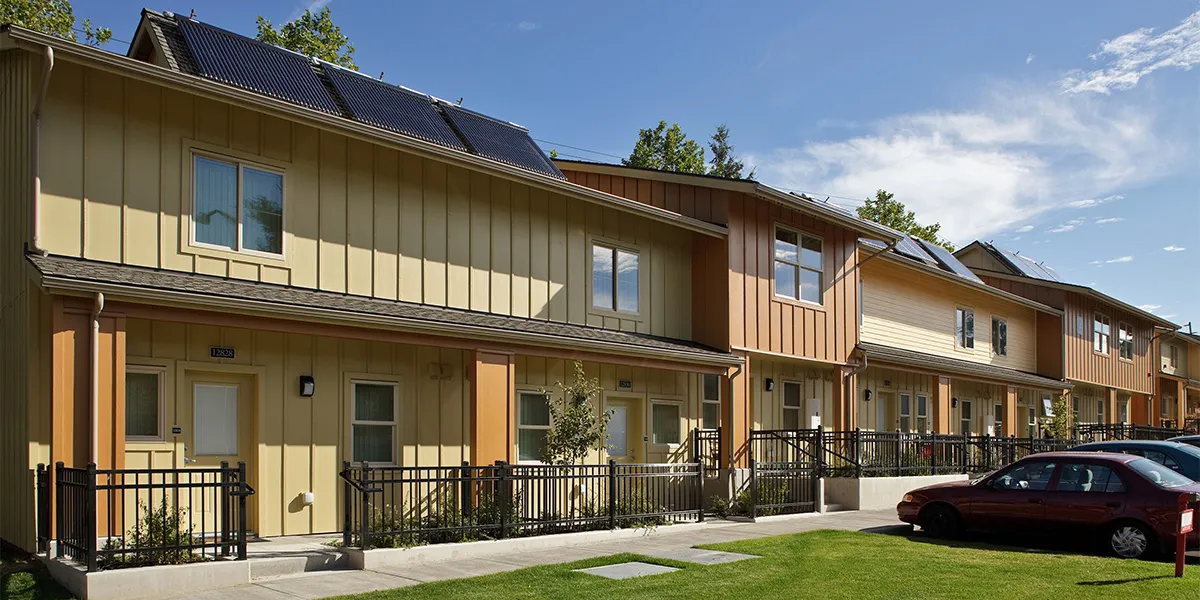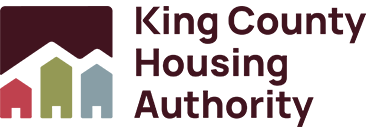Learn about our environmental, social, and governance program, and how we bring those values to life with green bonds, sustainable projects, and more.
Get Issuer Alerts
Add this issuer to your watchlist to get alerts about important updates.
Learn about our environmental, social, and governance program, and how we bring those values to life with green bonds, sustainable projects, and more.
About Our Program
KCHA takes important steps to limit its impact on the environment. In development projects, we use green building concepts such as energy-efficient construction and solar power. Working with residents and employees, KCHA also focuses on many sustainability initiatives and better managing waste at its properties and offices.
Green Building
KCHA invests heavily in constructing new neighborhoods and upgrading decades-old public housing buildings. These projects not only yield quality affordable housing but also conserve resources, maximize land use, maintain water quality, and reduce energy costs for residents with low incomes.
Greenbridge & Seola Gardens
KCHA is replacing two World War II-era public housing developments in White Center. Greenbridge and Seola Gardens are taking shape as mixed-income communities that bring together affordable rental housing with market-rate for-sale homes. They are designed to improve the local environment, conserve resources, and reduce energy use.
All housing in both new neighborhoods meets or exceeds Three-Star Built Green standards. Every building is wired to be solar-ready. Narrower roads, sidewalks, driveways, and parking areas lower the impervious surface area by 20 percent. In addition, Greenbridge features a series of bio-filtration swales that clean surface water runoff. At Seola Gardens, a water quality pond filters surface water before it leaves the site.
The Sixth Place Apartments at Greenbridge are home to the largest residential solar array in the state. Built from 213 panels, it sends up to 50.1 kilowatts of power to the electric grid. Sixth Place also features walls, roofs, and windows insulated to standards well beyond code requirements. All units use Energy Star lighting inside and out. Light tubes reduce the need to use electric lighting during the day.
The nearby Jim Wiley Community Center is powered with a 5 kilowatt solar array. A hydronic heat system keeps the building warm, while an open-air cupola regulates airflow and ventilation. The plaza behind the building covers a water quality vault that filters storm water before it returns to its natural downstream course.
Birch Creek
KCHA finished its revitalization of the 262-unit Birch Creek public housing complex in Kent in 2010. All apartments were upgraded with more energy-efficient heating systems, ventilation systems, and insulation. Birch Creek became the first affordable housing community of its kind to meet Four-Star Built Green standards.
One of its buildings features additional resource-saving features. Its roof-mounted solar panels pre-heat the water supply, while dual flush toilets and triple pane windows offer even greater efficiency. The building’s energy and water consumption are expected to be close to zero.
The site’s 10,800 square-foot Birch Creek Youth Center has been certified LEED Silver by the U.S. Green Building Council. It uses 20 percent less energy than typical buildings of the same size. The Youth Center’s exterior sunshades and energy-efficient lighting reduce the heating load by helping keep out the strong afternoon sunlight. Its low-flow toilets and showerheads and waterless urinals reduce potable water use by almost half.
The Village at Overlake Station
Completed in 2001, the Village at Overlake Station reflects a commitment to smart growth. It purposely places affordable housing near jobs, retail stores, and social services. Located next to a transit center in Redmond, it also offers convenient, car-free access to the Eastside. The community’s design and location help reduce urban sprawl, limit the need for parking, and ease traffic congestion.
Public Housing
KCHA continues to upgrade older residential complexes throughout the county. Some properties have seen major building envelope changes, such as new energy-efficient windows, increased insulation, and Energy Star roofs. Others now feature more efficient boilers, mini-split heat pumps, energy-efficient lighting, Energy Star bathroom fans, and water-conserving toilets, faucet aerators, and showerheads. The upgrades reduce utility use by 10 to 30 percent.
Sustainability
KCHA’s focus on resource conservation reduces operating costs and impacts to the environment, and improves the quality of life for residents. We work with residents and staff to save water and energy, reduce solid and hazardous waste, and purchase products made with recycled materials and fewer hazardous chemicals.
KCHA’s 2022-2026 Sustainability Action Plan details the strategies used to reach annual resource conservation goals.
Climate Action
KCHA recognizes climate change as a global problem that demands action at a local level. That is why the agency is committed to leading the nation’s public housing sector in reducing its dependency on fossil fuels and carbon-intensive products. In 2018, KCHA conducted a comprehensive greenhouse gas inventory report (PDF) — one of the first of its kind for a public housing agency — to quantify its carbon footprint and identify strategies to reduce its direct and indirect greenhouse gas emissions. Our greenhouse gas inventory report update (PDF), published in 2019, outlines how KCHA’s carbon footprint has changed.
Saving Water & Energy
KCHA installs WaterSense-rated fixtures in all of its buildings. Residents enjoy lower energy bills as a result, while KCHA reduces overall property management costs. Our standards for plumbing fixtures exceed code requirements and have helped reduce water use by more than 40 percent over standard low-flow fixtures, leading to nearly $1 million in savings. Energy conservation projects save KCHA and residents more than $650,000 per year.
In 2001 and 2016, KCHA entered into Energy Performance Contracts (EPCs) to fund the installation of energy-efficient lighting, heating, and ventilation, as well as water plumbing fixtures. More than 30 subsidized housing communities in 14 cities benefited from these upgrades.
An EPC is a financing technique that uses future utility cost savings from the installation of water- and energy-efficient technologies to repay for the cost of their installation. This method helps KCHA promote utility efficiency, cost savings, and environmental sustainability.
We are working with the Washington State Department of Enterprise Services and Johnson Controls to implement this project. Other partners include the U.S. Department of Housing and Urban Development, the Washington State Housing Finance Commission, King County’s Green Community Initiative, Puget Sound Energy, and Seattle City Light.
Reducing Solid Waste
KCHA started a recycling education program for residents in 2010. Since then, staff have worked one-on-one with thousands of households to teach good recycling habits. Residents have responded by recycling more waste and sorting it with greater care, reducing property garbage volumes by as much as 50 percent.
All KCHA properties and offices now offer recycling. 3 public housing communities also have a food waste composting service. In addition, maintenance staff at 15 properties now take advantage of on-site yard waste collection. This reduces staff time spent hauling yard debris to transfer stations, and also turns materials bound for the landfill into compost.
Involving the Community
KCHA’s employee-led Green Team helps raise staff awareness of good environmental practices. The committee sponsors activities such as local food potlucks, Earth Day clean-ups, efficient driving campaigns, and waste reduction initiatives. These efforts benefit staff both on the job and at home.
In 2018, the City of Tukwila recognized KCHA with the South King County Commute Trip Reduction Award.
In 2017, KCHA won the King County Green Globe Award, which recognizes organizations for outstanding achievement in environmental stewardship. KCHA also earned a leadership award from the Better Buildings Challenge sponsored by HUD and the U.S. Department of Energy.
In 2014, KCHA staff were honored by King County for participating in the EnviroStars program.
Image Gallery




